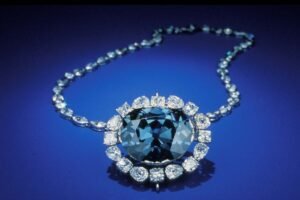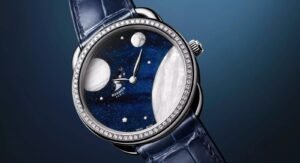12 Best Gold Chronograph Watches to Add to Your Collection
Chronographs are one of the most common (and useful) complications in a watch. Indeed, many collectors’ first complication is a chronograph. I know mine was. And while we tend to think of chronographs as a more utilitarian and sporty complication (it is a stopwatch), that doesn’t mean you can’t dress a chronograph up a little. Indeed, there are many great gold chronographs on the market for those of us who want a little bit of luxury. In this guide, we look at 12 of our favorite gold chronograph watches.
Breguet Type XX 2067RK

Price: $37,900 USD; Material: Rose Gold; Diameter: 42mm; Thickness:14.1mm; Lug-to-Lug: 48.8mm; Water Resistance: 100m; Movement: Automatic; Crystal: Sapphire.
Just last year, Breguet updated their pilot watch lineup, releasing the Type XX 2067 and Type 20 2057, both in stainless steel. And this year, as a follow-up, Breguet released the 2067RK (which also happens to be one of my favorite releases of 2024). While the general case shape and dial layout remains the same as the stainless steel model, it is a very different watch. From the rose gold case to the ceramic bezel (a first for Breguet), this is a very modern chronograph. And the dark sunray blue dial just pulls the whole piece together. The Breguet Type XX 2067RK retails for $37,900 USD. Make sure to check out our full review of the Breguet Type XX 2067RK here.
Rolex Daytona Le Mans Ref. 126528LN-0001

Price: $51,400 USD; Material: Yellow Gold; Diameter: 40mm; Thickness:12.2mm; Lug-to-Lug: 48mm; Water Resistance: 100m; Movement: Automatic; Crystal: Sapphire.
The Rolex Daytona Le Mans was released last year to perhaps the most fanfare I’ve ever seen for a modern Rolex. Rarity aside, the reverse panda dial and the Newman Daytona style subdial ticks struck a cord with collectors. Unfortunately, the model was released to commemorate the 100 year anniversary of the 24 Hour of Le Mans and Rolex decided to discontinue the model after only a year in production. But at Watches & Wonders 2024, it was leaked that Rolex had introduced a new, yellow gold version of the Le Mans. This version is off-catalog, so you will likely have to have a large purchase history from your Authorized Dealer. And while it’s list price isn’t known, it is likely close to the $51,400 USD of the white gold variation.
A. Lange & Sohne Datograph Up/Down Ref. 405.031

Price: $68,030 USD; Material: Rose Gold; Diameter: 41mm; Thickness:13.1mm; Lug-to-Lug: 48.4mm; Water Resistance: 30m; Movement: Manual Wind; Crystal: Sapphire.
Let’s get this out of the way. The A. Lange & Sohne Datograph Up/Down is somewhat of a grail watch for me. The watch is an attractive blend of traditional and modern. But it is also just as impressive from its specs. The chronograph has a flyback functionality as well as a jumping minute. And of course, the watch gets its namesake “Datograph” from the big date at 12 o’clock. When you turn the watch over, you will see perhaps the most beautifully decorated movement on any chronograph on the market. Because it is manual wind, the movement’s display is unimpeded by a rotor. So you see see clearly all the depths and detailing of the beautiful movement. It is truly a sight to behold. The A. Lange & Sohne Datograph Up/Down in pink gold retails for $68,030 USD.
Omega Speedmaster Moonwatch Professional Moonshine Gold

Price: $44,800 USD; Material: Moonshine Gold; Diameter: 42mm; Thickness:13.2mm; Lug-to-Lug: 47.5mm; Water Resistance: 50m; Movement: Manual Wind; Crystal: Sapphire.
The Omega Speedmaster might be the most famous chronograph on the planet. I mean, it’s been to the moon! And if you are looking for a gold chronograph, Omega has plenty of Speedy options for you. One piece I really like is the Speedmaster Moonwatch Professional in Moonshine Gold. And for those confused about what exactly Moonshine Gold is, it is a gold that is a bit paler than typical yellow gold and made up of roughly 75% gold, 14.5% silver, 9% copper, and 1% palladium. Details aside, this variation of the Moonwatch is just very attractive. The dial features a panda configuration with a Moonshine Gold Dial with black subdials. Matched with a black bezel, the watch is a luxurious take on one of the most famous chronographs in the world. It retails for $44,800 USD.
Audemars Piguet Royal Oak Chronograph Ref. 26240BA.OO.1320BA.02

Price: $78,200 USD; Material: Yellow Gold; Diameter: 41mm; Thickness:12.4mm; Lug-to-Lug: 51.5mm; Water Resistance: 50m; Movement: Automatic; Crystal: Sapphire.
Some people complain that there are just too many references of the Audemars Piguet Royal Oak out there. And while there are definitely quite a few references in the brand’s catalog, I’m not here to argue that point. Instead, I am going to talk about a reference that most definitely deserves to be part of the Royal Oak collection. The Royal Oak Chronograph Ref. 26240BA is truly a stunner. It features a yellow gold case, but the true star of the show is the dial. The dial is a fume pattern that is gold in the center and black around the outside. It is a truly unique piece that is sure to be a conversation starter. The Ref. 26240BA retails for $78,200 USD.
Patek Philippe Chronograph Ref. 5172G-010

Price: $85,900 USD; Material: White Gold; Diameter: 41mm; Thickness:11.45mm; Lug-to-Lug: 49.4mm; Water Resistance: 30m; Movement: Manual Wind; Crystal: Sapphire.
Choosing a Patek Philippe chronograph to feature in this guide was incredibly difficult. There are just so many worthy options. I could have easily picked a Nautilus or Aquanaut with chronograph complication and been done with it. But there is so much more to Patek than just the Nautilus and Aquanaut (though both are great watches). For example, the Ref. 5172G is modern and traditional aesthetic blend that works incredibly well. And the salmon dial just brings everything together in a beautiful package. The Patek Philippe Ref. 5172G-010 retails for $85,900 USD.
Jaeger-LeCoultre Duometre Chronograph Moon

Price: $72,000 USD; Material: Rose Gold; Diameter: 42.5mm; Thickness:14.2mm; Lug-to-Lug: N.A.; Water Resistance: 50m; Movement: Manual Wind; Crystal: Sapphire.
They call Jaeger-LeCoultre “the watchmaker’s watchmaker” for a reason. And I’d argue the new Duometre Chronograph Moon, released at Watches & Wonders 2024, is one of those reasons. First off, the watch is simply stunning. The dial is partially skeletonized around the three subdials and moonphase display. But the most impressive part of the watch is the movement. The Calibre 391 movement runs on two independent barrels and gear trains, one dedicated to the hour/minute indication, and the the other to complications. This allows the watch to have a respectable 50 hour power reserve. Truly a mechanical marvel. The Jaeger-LeCoultre Duometre Chronograph Moon in pink gold retails for $72,000 USD.
Breitling Navitimer B12 Chronograph 41 Cosmonaute

Price: $22,000 USD; Material: Rose Gold; Diameter: 41mm; Thickness:13.6mm; Lug-to-Lug: 47mm; Water Resistance: 30m; Movement: Automatic; Crystal: Sapphire.
The Breitling Navitimer’s claim to fame is that it is probably most iconic pilot watch. And on top of being iconic, it’s also incredibly useful. On top of the chronograph, the watch’s slide rule bezel allows pilots to make quick calculations on the fly. And if you want something a little more glitzy from your Navitimer, the B12 Chronograph 41 Cosmonaute is a great choice. The rose gold case is contrasted by a green sunray dial with black subdials. It looks great and the fact that the watch is in the smaller 41mm case makes it more wearable, at least in my opinion. The Navitimer B12 Chronograph 41 Cosmonaute retails for $22,000 USD.
Grand Seiko Spring Drive Chronograph SBGC230

Price: $42,000 USD; Material: Rose Gold; Diameter: 44.5mm; Thickness:16.8mm; Lug-to-Lug: 50mm; Water Resistance: 200m; Movement: Spring Drive; Crystal: Sapphire.
Grand Seiko’s Spring Drive technology is incredibly impressive. Spring Drive combines elements of both quartz and mechanical movements to create a more accurate movement that doesn’t rely on a battery. So if you’re looking at Grand Seiko, you should definitely consider one of their pieces with a Spring Drive movement. And the SBGC230 runs on the Caliber 9R96 Spring Drive movement with chronograph functionality and GMT. And, as you’d expect with Grand Seiko, you get a beautiful dial as well. The subtle red dial is meant to represent the mane of the lion. You have to look at it up close to truly appreciate it. The Grand Seiko Spring Drive Chronograph SBGC230 retails for $42,000 USD.
Zenith Chronomaster Sport El Primero

Price: $39,300 USD; Material: Rose Gold; Diameter: 41mm; Thickness:13mm; Lug-to-Lug: 47mm; Water Resistance: 100m; Movement: Automatic; Crystal: Sapphire.
No chronograph guide, even one about gold watches, is complete without arguably the first automatic chronograph the Zenith El Primero. Yes, there will be arguments about whether the El Primero or Seiko’s chronograph came first, but does it really matter? The El Primero has become an icon, and the brand’s gold models are incredibly versatile and attractive. The Chronomaster Sport comes in rose gold with white dial and and Zenith’s signature triple tone subdials. If this watch tickles your fancy, you can pick it up for $39,300 USD.
F.P. Journe LineSport Chronographe Rattrapante

Price: $82,200 USD; Material: Rose Gold; Diameter: 44mm; Thickness:12.1mm; Lug-to-Lug: 50mm; Water Resistance: 30m; Movement: Manual Wind; Crystal: Sapphire.
The LineSport Chronograph Rattrapante is probably the sportiest option from independant watchmaker F.P. Journe. The watch is on the larger size for an F.P. Journe at 44mm in diameter, but the lack of lugs and integrated bracelet make it wear much smaller than its size would suggest. The rose gold case and bracelet are offset by a beautiful grey dial with rose gold accents. It’s as much of a statement on your wrist as any Journe can be. When first released in 2021, it retailed for $82,200 USD.
Parmigiani Fleurier Tonda PF Split-Seconds Chronograph

Price: $169,100 USD; Material: Rose Gold; Diameter: 42mm; Thickness: 15mm.; Lug-to-Lug: N.A.; Water Resistance: 100m; Movement: Manual Wind; Crystal: Sapphire.
Parmigiani Fleurier has gained popularity in recent years with the release of their integrated bracelet sport watch, the Tonda. And because of that popularity, the brand has continually expanded the Tonda lineup, including releasing a slew of different chronographs. My favorite of their chronographs is probably their most complicated (and most expensive). The Tonda PF Split Seconds Chronograph is simply stunning. The rose gold sits in between rose and yellow gold, giving it a unique hue. And the grey dial is finished to perfection. It has a distinctive modern look that some brands overlook when designing new watches. It retails for $169,100 USD.




